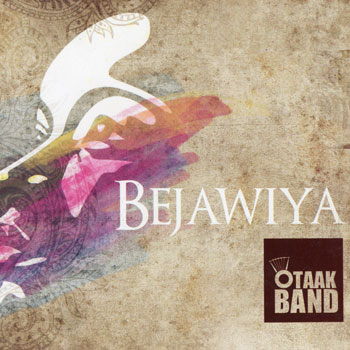Reviews August 28, 2012
Bejawiya
The Beja people of eastern Sudan (also parts of Eritrea and southern Egypt) are not widely known for their music. But if the songs of Ahmed Said Abuamna—the central figure in Otaak Band—are representative, they should be. Abuamna plays the masankop, an ancient lyre related to the Eritrean/Ethiopian krar, and the Egyptian simsimiyya. The masankop produces a variety of jangly, rhythmic drones and vamps, all based in distinctive pentatonic scales. Lovely stuff, but Abuamna’s real selling point is his spectacular singing voice. Whether interpreting Beja traditional songs, his own compositions, or pieces he created with his American collaborator here, Miguel Merino, Abuamna traces long satisfying vocal arcs. His timbre is dry and craggy, but also robust—a perfect embodiment of his lovelorn lyrics.
Take Abuamna’s song “Ogbil,” with its wrenching refrain, “O god, let me see this beautiful creature.” A loping vamp with oblique open harmony sets the mood, and that vocal—fluid and raspy—expresses love, desire and anguish with efficiency beyond language. With its minimal backing—a stalwart standup bass and frame drum—this song works beautifully as collaboration. Overall, the album is a series of experiments, ranging from unadorned solo performances (“Tehabay 1 and 2”) to full-on band numbers with bass, drums and, on the opening track “Ogna,” electric guitar.
In general, the more instrumentation involved, the less successful the experiment. “Ogna” has a strong, muscular groove, but a generic rock guitar solo spoils the mood. The percussion rich “Kwal/W’Afirhasa,” with cool tenor sax commentary works better. “Three Years” with its lounge-ready R&B or pop-gospel vibe (chiming keyboards and strings) is the album’s low point. For all I know, this number might be the hit in Sudan, or in Cairo, where this CD was recorded, but to American ears, it’s a very strange fusion of east African balladry and cheesy soft jazz.
For all this album’s many charms, it is hard to plumb the Otaak Band as a band. The collaboration between Abuamna—so wonderful he really needs no adornment—and Merino—tuned-in and tasteful on percussion—makes sense. The rest can feel tentative, at time even forced. The CD’s brief notes tell the story of Merino’s early encounters with the masankop (which he now plays) and Abuamna. Abuamna’s searing, supple voice put Merino in mind of American spirituals and blues. This idea is interesting, but it does not come through in these arrangements. Merino really brings a jazz sensibility—not blues—to Abuamna’s traditional fare. This is great for extending and unfolding the polyrhythms in Beja music, but when the production veers in a pop jazz direction, it feels like a mismatch.
Despite reservations, I do recommend this album. Its best tracks are sensational, and it is an introduction to a truly unique and underexposed niche in African traditional music. Kudos to Merino for bringing this sound to light. If Otaak Band is to have a future—either on stage or in the studio—one could hope for something more raw and organic. Based on this debut CD, the act might work best as a trio, with standup bass and Merino on drums and percussion. Other instruments could add, but only if they play from inside the rhythmic and melodic ideas of Beja music. Simply juxtaposing routine sounds from jazz, rock and pop undersells this beautiful and deep sound.









